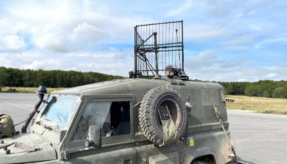
Innovative research to develop cutting-edge technology and make sure future offshore windfarms do not interfere with crucial military communications is underway following a £2 million Government investment.
In a move that could significantly boost the UK’s renewable energy growth, contracts have been awarded to Thales, QinetiQ, Saab, TWI and Plextek DTS to fast-track their ideas for technologies that could mitigate the impact of windfarms on the UK’s air defence radar system.
By guaranteeing essential defence communications are not affected, more wind farms can be built, creating a greener and more technologically sustainable Britain in record time.
The MOD’s Defence and Security Accelerator (DASA) is spearheading the innovation competition on behalf of the Department for Business, Energy and Industrial Strategy (BEIS), the Royal Air Force (RAF), and the Defence Science and Technology Laboratory (Dstl).
Defence Minister Jeremy Quin said: “We want more offshore wind farms to help deliver our ambitious environmental agenda while retaining the protection that radar provides.
“This is a great step forward in achieving this goal and shows Defence’s determination to support sustainability and deliver our green goals for Britain.”
The innovation contracts are part of the MOD’s commitment to the Government’s 2019 Offshore Wind Sector Deal, which expects wind power to fuel 30 percent of the UK’s electricity need by 2030.
Minister for Energy and Clean Growth, Kwasi Kwarteng said: “The continued growth of offshore wind is a national success story and this funding will ensure we continue to build bigger and more advanced projects vital to tackling climate change.
“The UK’s innovative spirit is second to none, which is why we are drawing from all areas of the country’s expertise to drive forward our incredible renewable energy fleet.”
DASA launched the Windfarm Mitigation for UK Air Defence competition in March, to find innovative solutions that lessen the impact off-shore wind turbines could have on military and civilian radar systems.
Wing Commander Helena Ramsden, Air Capability Strategy, Air Command, said: “This is a positive first step in getting cutting-edge innovation off the ground to harness the best technology from the brightest minds in the country.
“We are committed to keeping the skies above the UK safe from aerial threats whilst accelerating crucial work to allow the nation to do more to combat climate change.”
The successful bidders in DASA’s competition offered wide-ranging and complex ideas to tackle radar interference.
Thales, in collaboration with the University of Birmingham and SMEs, will develop surveillance to mitigate windfarm ‘clutter’, whereas Saab is developing a radar mitigation system using Artificial Intelligence and Doppler filtering.
QinetiQ is developing two proposals – the first approach uses new materials to stop the radar from being distorted. Their second proposal will develop radar-absorbing materials that can be put on off-shore wind turbines to limit interference.
TWI will develop novel methods for creating conductive coating for turbine blades that adsorb radar in partnership with the University of Exeter’s Centre for Metamaterial Research and Innovation. Finally, Plextek DTS is developing techniques to remove the effects windfarms have on radar data.
Robert Hammond-Smith, DASA delivery manager, said: “Crucial innovation like this is vital if we are to meet our renewable energy targets.
“This competition will not only help us meet our green energy needs but it will also help boost UK prosperity, entrepreneurs and innovators by investing in their potentially game-changing technology.
“DASA is proud to be working closely with BEIS, the RAF and Dstl to lead this important work which could transform the UK’s approach to offshore wind power generation.”
The UK is investing more in offshore wind than any other country and is home to the world’s largest windfarms: Walney and Hornsea 1 in the North Sea.
Walney wind farm generates power for more than 600,000 homes across Cumbria, while the impressive Hornsea 1 supports power for over one million households across the UK.
Offshore wind will play a key role in delivering net-zero emissions by 2050, with a Government commitment to scale it up to 40GW by the end of the decade.
BEIS has already invested £1.3 million into the Offshore Wind Innovation Hub and the Knowledge Transfer Network to encourage industry to come up with ways to accelerate wind farm development.
This would mean a huge increase in the number of wind farms being built off the UK’s shores, needing effective connection to the grid.
image © Crown Copyright
If you would like to join our community and read more articles like this then please click here







